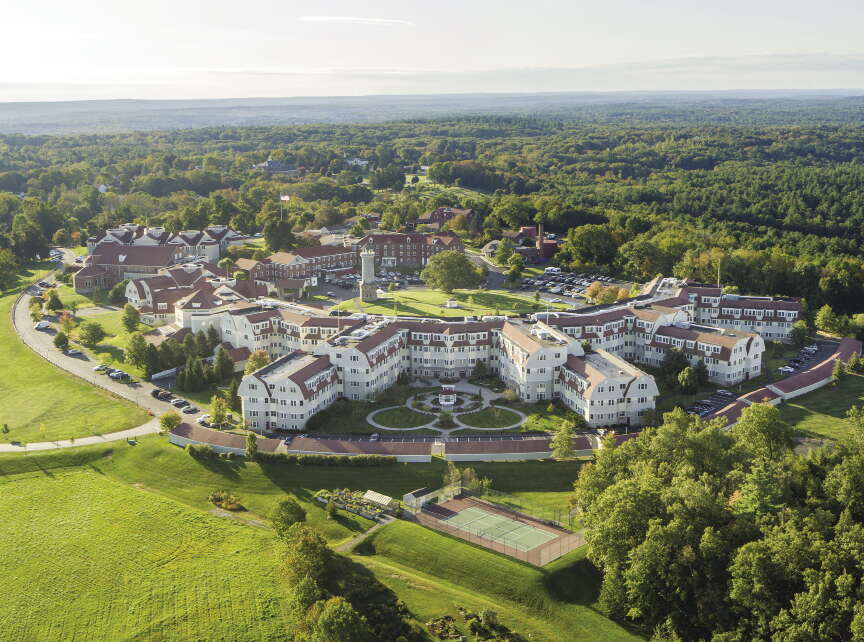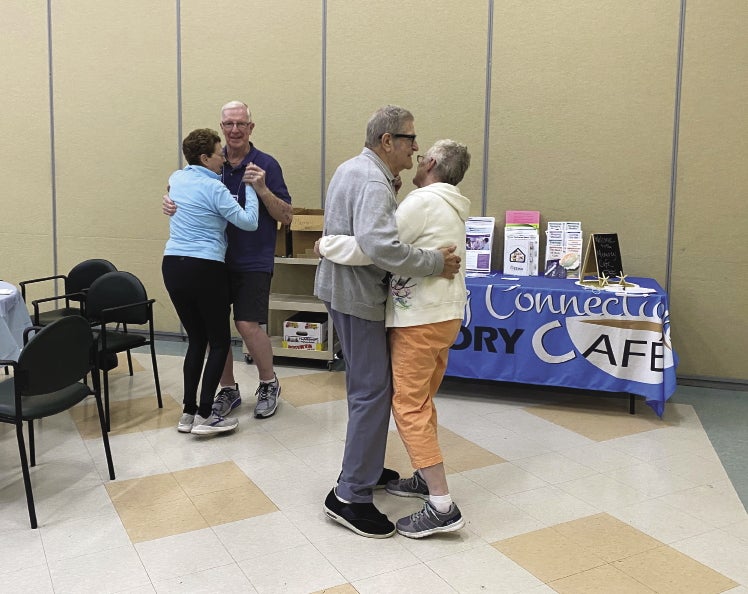
It’s a hard road, but community support is increasing for those facing dementia
 Photo | Courtesy of The Overlook
People dance at a Memory Cafe event at Elder Services of Worcester Area.
Photo | Courtesy of The Overlook
People dance at a Memory Cafe event at Elder Services of Worcester Area.
Dementia is a disease of aging that is, for many, the most frightening. Patients lose their sense of agency, and often become totally dependent on others for daily care. Personalities change, and people have emotional outbursts and constant needs, said Kathleen Walker, director of Memory Care at The Overlook, a Charlton retirement community offering a range of living options for aging people.
Yet dementia care is Walker’s passion. She left behind a banking career to work in marketing at an assisted living facility years ago and eventually moved into an activities management position. Eventually, Walker found herself working in memory care for people with different forms of dementia, whether vascular, Lewy body disease, or Alzheimer’s disease, the most common form.
“I feel like I’ve been given a special gift to help this population,” Walker said, adding that her connection to caregivers and patients alike is her niche.
A roadmap
Alzheimer’s disease – the biggest subset of dementia in the United States – is a force to be reckoned with for the healthcare system, communities, patients, and families. According to the Alzheimer’s Association, 130,000 people aged 65 and older are living with Alzheimer’s disease in Massachusetts, and 213,000 family caregivers shoulder the responsibility of their care, representing 308 million hours of unpaid care annually.
In 2020, the U.S. Centers for Disease Control and Prevention reported 5.8 million Americans were living with Alzheimer’s disease, and that number is expected to nearly triple by 2060.
State and federal agencies have responded with plans mapping out goals and initiatives to increase awareness and support for the aging population suffering from Alzheimer’s and other forms of dementia. The Healthy Brain Initiative Roadmap, a collaboration of state and federal partners, puts forth a framework for early detection, risk reduction, caregiver workforce development, and community engagement.
As a result, local programs aimed at dementia care outreach are increasing in number. Walker pointed to dementia awareness programs like Dementia Friendly Charlton, part of a statewide initiative, as evidence that public advocacy and support are growing.

Even places like The Overlook, which are private-pay facilities for residents, offer community outreach. Walker said a monthly free Memory Cafe is a much needed social outlet for the public dealing with dementia.
While all-consuming for people without funds for care in an assisted living facility or regular in-home care, Walker said a dementia diagnosis shouldn’t steal all of a family’s joy. Memory cafes, usually events that last about an hour and provide some form of entertainment like music, are increasing in Massachusetts, Walker said. It’s an opportunity to enjoy something fun with loved ones with dementia, in a no-judgment zone.
“We need to try to find the glimmer of light that still exists within people with dementia, and capitalize on it,” Walker said. “And the caregiver needs support so badly. They don’t always say it.”
Recognizing dementia

Repeating the same story or question, difficulty with everyday tasks, difficulty joining or maintaining a conversation, getting lost, personality changes, confusion about time and place, or troubling behavior such as neglecting grooming or poor judgment in handling money can all be warning signs of the onset of dementia.
It is important to note the more intelligent a person is, the easier it will be for them to mask symptoms. Changes in personality and behavior are important signals that a loved one is struggling with brain function.
Identifying a memory-related illness is just one step in the journey to provide care and comfort.
Talk to others
Unless you have daily contact with an aging family member, it is possible others are in a better position to look for warning signs. And that’s OK. Do not rule out the possibility a coworker, friend, or neighbor might be more attuned to abnormal changes in behavior and cognitive function.
If you are concerned, seek medical help. As with any disease, early detection is important in developing a treatment plan and finding ways to improve quality of life.
Activity matters
Suffering from dementia can often lead a person to withdraw from activities that have previously been important. Social isolation can lead to depression, which causes additional challenges in care.
Engaging in physical and mental activities, combined with healthy eating, can lower the risks of dementia and can keep your loved one suffering from dementia engaged and stave off isolation and depression.
Communication is key
When caring for someone who has Alzheimer’s disease or another form of dementia, you must pay attention to how you communicate.
Avoid multitasking. Keep distraction to a minimum when communicating with someone who is battling dementia. Put away your phone. Turn off the TV or radio and make sure you are fully dialed into the conversation.
Keep it simple. Processing communication can be difficult for someone coping with dementia-related illness. Speak slowly and understand repetition, while frustrating to you, can be beneficial to the other person. Ask yes-or-no questions.
Don’t argue. What your loved one is saying might be incorrect. It might be hurtful. But that person often does not understand and cannot control what they are saying. Correcting or arguing is not helpful.
Tone matters. Anger and irritation will still register, even if a person doesn’t recognize you and has trouble processing what you are saying. Stay patient.
Seek support
It’s imperative for people with loved ones facing an Alzheimer’s diagnosis – or any dementia diagnosis – to seek advice early. Nicole McGurin, program director for the Massachusetts and New Hampshire chapter of the Alzheimer’s Association, said the healthcare system for people with dementia is fragmented, and that makes planning care – and even understanding what’s covered by insurance and who pays for services – is overwhelming.
McGurin fills two main roles at the local Alzheimer’s Association chapter: overseeing a team of care consultants who provide care planning for people with Alzheimer’s and their loved ones, and community engagement efforts. She said the organization is working to change a lack of awareness about available resources, noting many people are at a loss for how to get help. She said a lot of programs cover low-income people on Medicaid, and more affluent people can afford assisted-living services.
“It’s a very big challenge, especially for people who are in the middle,” McGurin said. But she urged people who are facing an Alzheimer’s diagnosis in their family to call the Association’s 24/7 helpline, where a highly specialized expert can provide next steps and share options based on where a person lives. The helpline is 800-272-3900. More information can be found at www.alz.org.
Sources: Alzheimer’s Association; U.S. Centers for Disease Control and Prevention









0 Comments